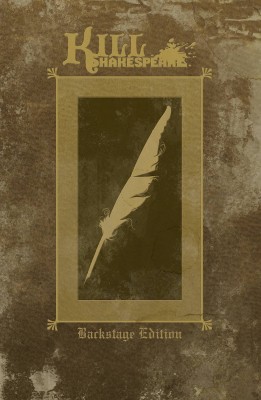People that enjoyed the way that Fables brought together their favorite fairy tale characters were probably ecstatic in 2010 when the first issue of Kill Shakespeare did the same for the bard’s greatest characters. This month, the series’ first story arc is released in its entirety in Kill Shakespeare: Backstage Edition Volume 1. 
In concept, the story here is one every high school student can get behind: the heroes and villains of Will’s great tragedies are fed up with the endings he has planned for them and decide that the best ending of all will be when Shakespeare is dead and they’re free to choose their own destinies. Led by Richard III and Lady Macbeth, they want the power of Will’s words for themselves.
Not everyone thinks that Shakespeare should die, and regard him as a kind of god. This group is led by Juliet Capulet and Othello, somehow unscathed from their respective suicides. Allied to no side in the beginning is Hamlet, spirited away when pirates attack the ship bearing him from Denmark to England and told he is the key to locating the legendary bard.
Many of the characters depart from their classic characterization, but the passage of unknown amounts of time between their former story’s end and the time of Kill Shakespeare could account for some off-page character development. Juliet specifically references her past as a “spoiled young girl” multiple times when rallying her troops.
Hamlet at least remains traditionally indecisive and mercurial, vacillating constantly over who he should trust and whether he is allowed to be happy while his father goes unavenged. Frankly, by the end of the volume this is just a bit tedious- however, if Hamlet is to survive to drive more plots forward, I suppose a happy ending isn’t in the pages.
The thing that bothers me most about this entire series is the way they model the dialogue after Elizabethan speech, but are constantly misusing the archaic pronouns “thee”, “thou”, and “thy”. Heads up, writing and editing team, those are pronouns with their own grammatical rules, you can’t just replace any old “you” or “your” and suddenly have honest-to-goodness Shakespeareanese. All it really accomplishes is making the characters sound a little inauthentic and really awkward.
The addition of the annotations at the end of each issue do help the reader pick up on the subtle Shakespearean easter eggs sprinkled throughout, and help the less classically inclined to understand character motivations and background.
It’s hard to say whether this is better suited to Shakespeare nerds or people who still aren’t sure what “wherefore” means. On the one hand, waiting until the annotations to understand what happened in each issue means some amount of frustration for the uninitiated. However, fans of the classics may not be able to manage their expectations enough to enjoy the story for what it is.
The first volume of Backstage Edition is available starting May 20th from IDW.





